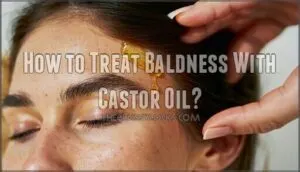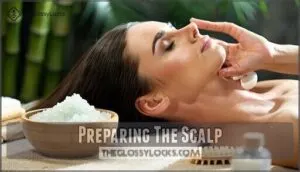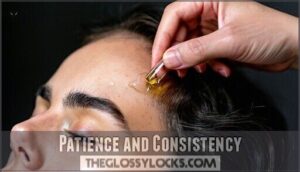This site is supported by our readers. We may earn a commission, at no cost to you, if you purchase through links.

Massage it in gently, focusing on areas with thinning hair. Castor oil’s ricinoleic acid may boost blood flow to hair follicles, promoting growth.
For extra oomph, mix it with coconut or rosemary oil. Leave it on for 30 minutes or overnight, then rinse with a mild shampoo.
Repeat 2-3 times weekly, but don’t expect miracles overnight—hair growth takes patience. Be consistent, and keep an eye out for skin sensitivity.
Curious about pairing castor oil with other treatments? There’s more to explore!
Table Of Contents
- Key Takeaways
- How to Treat Baldness With Castor Oil?
- Understanding Baldness
- Castor Oil and Hair Growth
- Applying Castor Oil for Baldness
- Combining Castor Oil With Other Treatments
- Patience and Consistency
- Addressing Underlying Causes
- Precautions and Potential Side Effects
- Frequently Asked Questions (FAQs)
- Is castor oil a miracle cure for baldness?
- Can castor oil regrow hair in a bald spot?
- Does castor oil help with hair loss?
- How to use castor oil on hair?
- Does castor oil increase hair growth?
- Can castor oil cause hair to fall out?
- Can castor oil regrow hair on a bald head?
- How to use castor oil for baldness?
- Can castor oil really regrow hair?
- How to use castor oil for balding?
- Conclusion
Key Takeaways
- Apply castor oil 2-3 times weekly by warming it slightly, massaging into your scalp for 5-10 minutes, then leaving it on for at least 30 minutes or overnight before washing with a mild shampoo.
- Don’t expect overnight miracles – hair growth takes months to show results, and castor oil won’t regrow hair on completely bald areas, though it may strengthen existing hair and improve scalp health.
- Boost effectiveness by combining treatments – mix castor oil with essential oils like rosemary or peppermint, take supplements like biotin and omega-3s, and maintain a healthy lifestyle with proper nutrition and stress management.
- Watch for skin sensitivity and be consistent – always do a patch test first, use old towels to prevent staining, and stick to your routine for several months while monitoring progress through photos and measurements.
How to Treat Baldness With Castor Oil?
To treat baldness with castor oil, apply it to your scalp, massage, and leave overnight.
Apply castor oil, massage gently, and let it work overnight—nourish your scalp for healthier, stronger hair growth.
Use castor oil twice a week for stimulating hair growth and reducing hair loss, considering castor oil benefits and application safety for effective baldness treatment.
Understanding Baldness
You’re likely reading this because you’re experiencing baldness, which can be caused by a combination of genetic, hormonal, and environmental factors.
To understand how to treat baldness with castor oil, it’s vital to first grasp the basics of baldness, including its causes, types, and how it affects your hair and scalp.
Causes of Baldness
Baldness can happen for several reasons. Let’s explore them.
- Stress and Baldness: High stress can disrupt your hair’s growth cycle, causing hair loss.
- Autoimmune Alopecia: Your body mistakenly attacks hair follicles.
- Chemotherapy and Medication: Treatments may cause temporary or permanent hair loss.
- Genetic Predisposition and Hormonal Imbalance: Genetic factors and hormonal factors, including DHT, affect hair density.
Understanding these causes is key to managing baldness effectively.
Types of Baldness
You’re likely familiar with male and female pattern baldness, but did you know there’s also Alopecia Areata, Telogen Effluvium, Traction Alopecia, and Scarring Alopecia?
These types of baldness affect hair loss differently, and castor oil may help with hair regrowth, particularly for Androgenetic Alopecia, a common cause of baldness.
Genetic and Hormonal Factors
You’re exploring genetic and hormonal factors in baldness.
These include:
- DHT sensitivity
- Genetic predisposition
- Hormonal imbalances
- Family history
Androgen receptors, which castor oil may help with, as a potential DHT blocker, to address genetic hair loss and hormonal factors.
A healthy scalp is essential, impacting hair growth directly to ensure proper hair care.
Castor Oil and Hair Growth
You’re looking for a natural way to treat baldness, and castor oil may be a solution.
Castor oil’s properties, such as improving blood circulation and reducing inflammation, can potentially support hair growth, so you’ll want to understand how it works and how to use it effectively.
Composition of Castor Oil
You’ll find castor oil is rich in ricinoleic acid and fatty acids, which enhance hair thickening and shine.
Thanks to its omega 6 fatty acids and vitamin E content, offering antioxidant properties.
Potential Benefits for Hair Growth
Castor oil works wonders for scalp circulation and follicle stimulation, thanks to its ricinoleic acid content.
It hydrates the scalp, boosts keratin production, and strengthens strands, aiding hair thickening.
By creating a healthier environment, it may support hair growth and even help with DHT purging, which contributes to hair regrowth.
While results vary, it’s a natural ally against baldness.
Limitations of Castor Oil for Hair Regrowth
Don’t pin all your hopes on castor oil for baldness—it’s no magic bullet.
Its limitations include:
- Unrealistic expectations: Hair regrowth claims lack solid proof.
- Limited scientific evidence: Benefits remain mostly anecdotal.
- Application challenges: Thick texture may cause buildup or matting.
- Individual variability: Results differ widely.
- Alternative treatments: Consider combining oils or supplements.
Manage expectations and explore other options for hair loss solutions.
Applying Castor Oil for Baldness
To use castor oil for baldness, start by preparing your scalp to guarantee maximum absorption.
With the right massage techniques and consistent application, you’ll give your hair the best chance to thrive.
Preparing The Scalp
Before applying castor oil, prepping your scalp is like setting the stage for a great performance. Start with scalp exfoliation to remove buildup and dead skin.
Follow with gentle cleansing methods for a fresh base. Hydration techniques keep your scalp supple, while circulation boosts from brushing enhance hair follicle stimulation.
A quality scalp exfoliation scrub can greatly assist this process. Avoid harsh chemicals—they’re scalp health’s worst enemy!
| Step | Method | Benefit | Frequency |
|---|---|---|---|
| Exfoliation | Use a gentle scrub | Removes buildup | Weekly |
| Cleansing | Wash with mild shampoo | Clears residue | 2–3 times weekly |
| Hydration | Apply conditioner | Prevents dryness | After every wash |
| Circulation Boost | Brush scalp gently | Stimulates follicles | Daily |
Massage Techniques
Start with clean, dry hair and use your fingertips for a scalp massage with castor oil.
Apply moderate pressure in circular motions, focusing on areas prone to baldness.
This scalp massage improves blood flow, aiding hair follicle stimulation and absorption.
To further enhance these benefits, consider techniques to promote blood flow.
Keep it gentle and rhythmic—think of it as a mini workout for your scalp!
Skip tools; your hands work best here.
Frequency and Duration of Application
Consistency is key for castor oil to support hair growth and tackle baldness.
Follow this simple routine:
- Massage Duration: Gently massage the oil into your scalp for 5–10 minutes.
- Application Duration: Leave it on for at least two hours or try an Overnight Treatment.
- Wash: Use shampoo to remove thoroughly.
- Application Frequency: Stick to 2–3 times weekly for Long-Term Use.
Combining Castor Oil With Other Treatments
You can boost castor oil’s effects by pairing it with other treatments like essential oils, supplements, or scalp massages.
This combination supports hair health from multiple angles, giving your scalp the extra care it needs, which can be further enhanced by understanding how these treatments work together to promote hair health.
Essential Oils
Pairing castor oil with essential oils creates powerful Oil Blends for baldness.
Rosemary stimulates follicles, peppermint invigorates circulation, and lavender calms irritation.
Always dilute for Safe Usage.
Essential oils may help with baldness.
Essential oils offer Aromatherapy Benefits, enhancing your hair loss treatment experience.
| Oil Type | Scent Profiles | Extraction Methods |
|---|---|---|
| Rosemary | Earthy, herbal | Steam distillation |
| Peppermint | Cool, minty | Cold pressing |
| Lavender | Floral, soothing | Steam distillation |
These blends nourish your scalp for effective hair regrowth.
Supplements
Supplements can supercharge your baldness battle when paired with castor oil.
Address vitamin deficiencies and improve hair regrowth with these essentials:
- Biotin: Boosts keratin production for stronger hair.
- Omega-3s: Reduce inflammation and nourish follicles.
- Vitamin D: Activates dormant follicles.
- Zinc: Supports tissue repair and scalp health.
- Herbal supplements: Natural DHT blockers for hair loss treatment.
For ideal results, explore options for biotin-related hair products.
Scalp Massages
When tackling baldness, scalp massages paired with castor oil can boost hair growth and relaxation.
Gentle techniques improve blood flow and oil absorption, waking up dormant follicles. Scalp massages may also lower stress hormones, which can further help with hair growth.
Try these:
- Circular motions to spread oil evenly.
- Massage pressure to energize the scalp.
- Massage tools for deeper stimulation.
- Relaxation techniques to reduce stress.
Consistency transforms this routine into a follicle-friendly ritual!
Patience and Consistency
Regrowing hair with castor oil takes time, so don’t expect overnight miracles. Stick with your routine consistently, and you’ll give your scalp the best chance to show results.
Realistic Expectations for Hair Regrowth
Hair regrowth isn’t a sprint—it’s more like planting seeds.
Castor oil supports growth, but results take time. Manage expectations and stick to consistent application for gradual improvement. Think of it as a holistic approach to hair loss treatment.
Here’s a quick guide:
| Aspect | Explanation | Tip |
|---|---|---|
| Growth Timeline | Gradual over months | Stay patient |
| Treatment Limitations | No instant results | Pair with other remedies |
| Consistent Application | Key to visible change | Apply regularly |
Monitoring Progress Over Time
Monitoring progress with castor oil isn’t rocket science, but patience is required.
Use photo documentation monthly to spot changes in density or regrowth. Track strands by measuring length and thickness. Keep a journal to log reactions and tweaks in your hair growth cycle.
- Compare photos to spot subtle improvements.
- Measure strands for tangible results.
- Stick to consistent application for accuracy.
Adjusting The Routine as Needed
Sometimes, your scalp condition or sensitivity changes, requiring routine adjustments. Experiment with oil combinations or tweak the application frequency based on progress.
If castor oil feels heavy, dilute it. Notice signs of irritation? Scale back. Hair regrowth takes patience, so listen to your scalp. Think of it as a dance—finding the rhythm that suits your hair growth journey best.
| Adjustment Type | Suggested Change | Signs to Watch For | Frequency to Reassess |
|---|---|---|---|
| Oil combinations | Add lighter carrier oils | Greasiness or heaviness | Monthly |
| Application frequency | Reduce weekly applications | Scalp irritation | Every 2 weeks |
| Sensitivity changes | Switch to milder formulas | Redness or itchiness | Weekly |
| Scalp condition | Exfoliate or hydrate more | Dryness or flaking | Bi-weekly |
Addressing Underlying Causes
To tackle baldness effectively, you’ve got to address what’s causing it in the first place.
From medical conditions to lifestyle habits, pinpointing these factors can make a big difference in your hair’s health.
Identifying and Treating Medical Conditions
When baldness strikes, it’s often linked to underlying medical conditions like autoimmune alopecia or nutrient deficiencies.
Identifying these issues is key to effective treatment. Look for these common triggers:
- Autoimmune Alopecia: Patchy hair loss, needing a specialist.
- DHT Purging: Hormonal imbalances affecting follicles.
- Scalp Inflammation: Redness or itchiness, requiring care.
- Nutrient Deficiencies: Brittle hair from poor diet.
- Fungal Infections: Scalp irritation needing antifungals.
Consult a healthcare professional for personalized solutions. This may be alopecia areata, an autoimmune condition that causes hair loss.
Lifestyle Changes to Support Hair Health
A few lifestyle changes can work wonders for your scalp and hair health, especially when paired with castor oil treatments.
Focus on nourishing your body and reducing stress to support hair growth naturally. A holistic approach includes addressing essential vitamin deficiencies.
- Dietary Changes: Eat foods rich in vitamins, proteins, and minerals.
- Stress Reduction: Try yoga, meditation, or deep breathing.
- Exercise Benefits: Boost circulation with regular workouts.
- Sleep Quality: Aim for 7–8 hours of restful sleep.
- Hydration Importance: Drink plenty of water daily.
Consulting With a Healthcare Professional
Talking to a healthcare professional can uncover hidden causes of baldness, like medical conditions or medication interactions.
They’ll review your medical history, suggest alternative therapies, and set realistic expectations. A specialist referral might pinpoint effective solutions.
Skip trial-and-error—professional advice guarantees castor oil and other treatments target your hair loss safely.
| Need | Professional Role | Outcome |
|---|---|---|
| Medical history | Doctor | Personalized treatment plan |
| Medication interactions | Pharmacist | Safe therapy combinations |
| Alternative therapies | Specialist referral | Targeted hair loss solutions |
Precautions and Potential Side Effects
Before you start slathering castor oil on your scalp, it’s smart to know the possible risks.
From skin irritation to stained pillowcases, a little caution can save you some headaches later.
Skin Sensitivity
Skin sensitivity to castor oil can cause discomfort during topical application for baldness.
Watch for:
- Allergic Reactions: Redness, itching, or swelling after use.
- Contact Dermatitis: Persistent inflammation where applied.
- Hair Dryness: Overuse or poor dilution ratios may worsen hair loss.
Always perform a patch test, dilute the oil properly, and adjust application frequency to avoid irritation.
Staining of Hair and Clothing
Castor oil’s thick texture can leave stubborn stains on clothing and fabrics.
To avoid mishaps, stick to old towels or colorfast fabrics as protective measures during application.
If staining happens, act fast—pre-treatment tips like using stain removers work wonders.
Cover surfaces, wear an old shirt, and keep things simple, as baldness treatments shouldn’t ruin your wardrobe, and using old towels can be a good preventive measure.
Proper Storage and Shelf Life of Castor Oil
Keep your castor oil effective by storing it in a cool, dark place, away from heat and light exposure.
Use airtight, dark glass containers to prevent oxidation.
Watch for signs like a rancid smell or color change—these mean it’s past its expiration date.
With proper storage, the shelf life typically lasts up to a year, helping you tackle baldness confidently.
Frequently Asked Questions (FAQs)
Is castor oil a miracle cure for baldness?
Baldness isn’t easily cured, but castor oil might help.
Its antifungal and anti-inflammatory properties support scalp health, while ricinoleic acid may stimulate dormant follicles.
Results vary, so patience and consistent use are essential.
Can castor oil regrow hair in a bald spot?
Imagine your scalp as a dry garden.
Castor oil won’t magically sprout new hair in bald spots, but its nutrients and blood flow boost may help dormant follicles.
Patience and consistent care are your best tools.
Does castor oil help with hair loss?
Hair loss can be tricky, but using castor oil might help.
Its nutrients and ricinoleic acid improve scalp health, strengthen follicles, and reduce breakage.
While regrowth isn’t guaranteed, it’s worth trying consistently.
How to use castor oil on hair?
Warm castor oil slightly, mix it with a carrier oil like coconut or almond oil, and massage into your scalp.
Leave it overnight or at least 30 minutes, then rinse with a gentle shampoo.
Does castor oil increase hair growth?
Castor oil may boost hair growth by improving scalp blood flow and nourishing follicles with fatty acids and vitamin E.
While evidence is mostly anecdotal, consistent use might strengthen strands and support healthier, fuller-looking hair.
Can castor oil cause hair to fall out?
Could something so nourishing actually cause harm?
Castor oil itself doesn’t directly cause hair loss, but using too much or failing to rinse thoroughly can clog pores, irritate your scalp, and potentially weaken hair roots.
Can castor oil regrow hair on a bald head?
Unfortunately, there’s no solid scientific evidence that castor oil can regrow hair on completely bald areas.
While it may strengthen existing hair and improve scalp health, you shouldn’t expect miraculous regrowth results.
How to use castor oil for baldness?
Studies show 85% of men experience significant hair loss by age
Start by warming two tablespoons of castor oil, then massage it into your scalp using circular motions for 10-15 minutes before leaving overnight.
Can castor oil really regrow hair?
No solid scientific evidence proves castor oil regrows hair.
However, its ricinoleic acid may improve blood circulation and strengthen existing strands.
You’ll likely see better hair health rather than miraculous new growth.
How to use castor oil for balding?
Nearly 50% of men experience hair loss by age
You’ll want to warm castor oil slightly, massage it into your scalp for 10-15 minutes, then leave it overnight before washing with sulfate-free shampoo twice weekly.
Conclusion
Remember, treating baldness naturally requires dedication, consistency, and realistic expectations.
Castor oil offers potential benefits through ricinoleic acid’s circulation-boosting properties, but it’s not a miracle cure.
You’ll need patience as hair growth cycles take months to show results.
How to treat baldness with castor oil involves regular application, proper technique, and combining it with healthy lifestyle choices. Monitor your progress, watch for sensitivities, and don’t hesitate to consult healthcare professionals if underlying conditions contribute to your hair loss.














